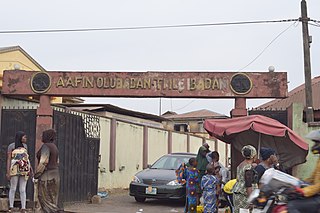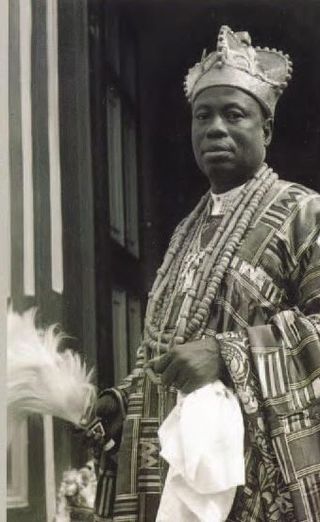Related Research Articles

The Oyo Empire was a powerful Yoruba empire of West Africa made up of parts of present-day eastern Benin and western Nigeria. It grew to become the largest Yoruba-speaking state and rose through the outstanding organizational and administrative skills of the Yoruba people, wealth gained from trade, and a powerful cavalry. The Oyo Empire was one of the most politically important states in the entirety of Western Africa from the mid-17th to the late 18th century, and held sway not only over most of the other kingdoms in Yorubaland, but also over nearby African states, notably the Fon Kingdom of Dahomey in the modern Republic of Benin on its west.

The Egba people are a subgroup of the Yoruba people, an ethnic group of western Nigeria, a majority of whom are from the central part of Ogun State that is Ogun Central Senatorial District.
Oríkì, or praise poetry, is a cultural phenomenon amongst Yoruba-speakers of West Africa.
Oba means ″ruler″ in the Yoruba and Bini languages of West Africa. Kings in Yorubaland, a region which is in the modern republics of Benin, Nigeria and Togo, make use of it as a pre-nominal honorific. Examples of Yoruba bearers include Oba Ogunwusi of Ile-Ife, Oba Aladelusi of Akure, and Oba Akiolu of Lagos. An example of a Bini bearer is Oba Ewuare II of Benin.

Oloye Sir Adeyemo Alakija, Listen was a Nigerian lawyer, politician and businessman. He served as a member of the Nigerian legislative council for nine years starting in 1933. In 1942, he became a member of the governor's Executive Council. Alakija was president of Egbe Omo Oduduwa from 1948 until his death in 1952.
Orompoto was an Alaafin of the Yoruba Oyo Empire. The empire of which she ruled is located in what is modern day western and north-central Nigeria.

Olubadan is the royal title of the king of Ibadanland in Nigeria. Ibadan was founded in the 16th century, but the present Yoruba people only took control around 1820. By 1850 they had established their unusual succession principle, which is quite different compared with other traditional Yoruba rulers in that it alternates between two lines. It usually takes decades to groom an Olubadan for the stool through stages of chieftaincy promotion, thus meaning that just about any male born title-holder of the metropolitan centre is a potential king.
The Olowu of Owu is the paramount Yoruba king of Owu kingdom. The first Olowu of Owu is also one of the original kings in Yorubaland.
Egba Ake, otherwise known as Egba Alake, is one of the five sections of Egbaland, the others being Oke-Ona, Gbagura, the Owu and Ibara. It is a traditional state which joins with its bordering sections to form something of a high kingship. The Alake of Abeokuta, or Alake of Egbaland, is the traditional ruler of the Egba clan of Yoruba in the city of Abeokuta in southwestern Nigeria.
The Ilorin Emirate is a traditional state based in the city of Ilorin in Kwara State, Nigeria. It is largely populated by the Yoruba-speaking people, though the kingdom is a hybrid state due to the influence of the many other tribes that make up the city. It is one of the Banza Bakwai - or copy-cats of the legitimate Hausa Kingdoms - as a result of it being part of the Sokoto Caliphate.

The Alake of Egbaland is the paramount Yoruba king of the Egba, a clan in Abeokuta, Ogun State, southwestern Nigeria. Egba consists of Egba Ake, Owu kingdom, Oke-Ona and Egba Gbagura.
Oba Sir Ladapo Samuel Ademola KBE, CMG (1872–1962), also known as Ademola II, was the Alake of Abeokuta from 1920 to 1962. Before he was crowned Alake, Ademola was involved in the affairs of the Egba United Government. As a member of the Egba council, he was a leading participant in negotiations with the Lagos State colonial government in 1889 for the rights to construct railway tracks passing through Egbaland. In 1904 he travelled with Alake Gbadebo to the U.K., where they were received by King Edward VII. He succeeded Oba Gbadebo in 1920 with overwhelming votes from the Egba council.
The Iyalode is a high-ranking female chieftain in most of the Yoruba traditional states. The title is currently within the gift of the obas, although Njoku asserted in 2002 that the process of choosing an Iyalode in pre-colonial Nigeria was less of a choice by the monarch, and more of the accomplishment and involvement of the woman to be so honoured in economic and political matters.

The Nigerian Chieftaincy is the chieftaincy system that is native to Nigeria. Consisting of everything from the country's monarchs to its titled family elders, the chieftaincy as a whole is one of the oldest continuously existing institutions in Nigeria and is legally recognized by its government.
Egba Gbagura is one of the five sections of Egbaland, the others being Ake, Oke-Ona, the Owu and Ibara. It is a traditional state which joins with its bordering sections to form something of a high kingship.
The Oyo Mesi is the privy council of Oyo, a Yoruba traditional state in Southwestern Nigeria. It dates to the medieval period, when it served as the government of a powerful pre-colonial state that was known as the Oyo empire.
Emi Omo Eso is the name ascribed to the moral code of the Eso Ikoyi warrior caste of the Yorubas of West Africa. Its literal translation is I am the child of an Eso.
Chief Abiola Dosunmu, is a Nigerian businesswoman, socialite and traditional aristocrat. In addition to a variety of other chieftaincy titles, she currently holds that of the Erelu Kuti IV of Lagos.
Okukenu Sagbua was a Yoruba Egba chief. He was a founding member of the Ogboni of Egbaland, and also served as the first Alake of Egbaland.
Orile Ijaye is a small town located in Akinyele local government, Oyo state, Nigeria. It is about 18 miles from Ibadan, Oyo state capital. This town was re-inhabited in 1895, thirty-two years after it was destroyed due to an intra-tribal and supremacy war with Ibadan; another military power at that time. It was in 1895 they named it, Orile Ijaye from the original name, Ijaye.
References
- ↑ "Definition of warrior | Dictionary.com". www.dictionary.com. Retrieved 2023-01-05.
- ↑ Sotunde, F.I. (2002), "Egba Chieftaincy Institution", p 61.
- ↑ Johnson, Samuel (1921), "The History of the Yorubas from the Earliest Times to the Beginning of the British Protectorate", pp 73-75.
- ↑ J.F. Ade.Ajayi and Yemi Akinseye-George (2002), "Kayode Eso: The Making of a Judge", p 2.